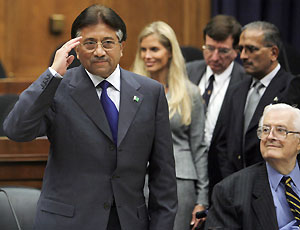Asia-Pacific
Pakistan leader says US made threats
(AP)
Updated: 2006-09-22 08:18
 |
Large Medium Small |
WASHINGTON - President Pervez Musharraf of Pakistan says the United States threatened to bomb his country back to the Stone Age after the 9-11 attacks if he did not help America's war on terror.
 Pakistan's President Pervez Musharraf (L) salutes Rep. Henry Hyde (R-IL) and members of the House International Relations Committee on Capitol Hill in Washington September 21, 2006. [Reuters] |
"The intelligence director told me that (Armitage) said, 'Be prepared to be bombed. Be prepared to go back to the Stone Age,'" Musharraf said in the interview to be shown Sunday on the CBS television network.
It was insulting, Musharraf said. "I think it was a very rude remark," he told reporter Steve Kroft.
But, Musharraf said he reacted responsibly. "One has to think and take actions in the interests of the nation and that is what I did," he said.
According to 60 Minutes, Armitage disputed the language attributed to him but did not deny the message was a strong one. The former deputy secretary of state could not be reached immediately by the Associated Press Friday at his home or his office.
In a speech in January 2002, four months after the attacks on the World Trade Center and the Pentagon, Musharraf gave a speech in which he clearly came down on the side of reform at home and opposition to Islamic fundamentalism.
Pakistan to this day is considered a close ally of the United States in the struggle with militant groups. Sometimes, however, Pakistan appears reluctant to go after Taliban, which controlled neighboring Afghanistan until 2001 and has intensified its insurgency in the southern part of the country in recent months.
He is scheduled to meet on Friday at the White House with President Bush and then see Bush again next week in a three-way meeting with President Hamid Karzai of Afghanistan.
Musharraf told 60 Minutes that Armitage's message was delivered with demands that he turn over Pakistan's border posts and bases for the U.S. military to use in the war against the Taliban in Afghanistan. Some were "ludicrous," such as a demand he suppress domestic expression of support for terrorism against the United States.
"If somebody is expressing views, we cannot curb the expression of views," Musharraf said.
Julie Reside, a State Department spokeswoman, declined to comment on the reported conversation between Armitage and a Pakistani official.
"We are referring all questions to Mr. Armitage," she said.
Pakistan for years has been a close ally in the war on terrorism, Reside said. "We are continuing to work cooperatively with them and in the process are broadening our bilateral relationship," she said.
The White House declined to comment on the record on the reported conversation between Armitage and a Pakistani intelligence official.